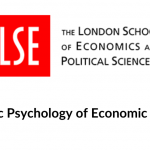The MSc Psychology of Economic Life is organised along two themes: understanding economic behaviour and shaping economic behaviour beyond Homo Economicus (economic man).
How does the programme provide content to ensure students achieve an understanding of a reasonably diverse set of perspectives on understanding economies?
Framed by a distinctive approach to economic psychology (articulating history of thought and contemporary analyses), the course pays particular attention to the social environments that enable and support positive behaviour change in settings characterised by cultural diversity, a need for sustainability and alternative models to growth.
The problem addressed by the MSc Psychology of Economic Life is therefore to explore new ways of constructing sustainable Production-Consumption Systems, and to manage the transition from the current state to a more sustainable one, taking into account actual humans (Homo Sapiens) rather than Homo Economicus. This exploration must be informed by a realistic psychology, with a critical but practical, constructive approach and concrete application to real cases, which is the objective of this programme.
How does the programme ensure students understand the interaction between economic and ecological systems?
Assessments in Psychology of Economic Life are part of the learning experience and include a theoretical individual essay in a given topic that highlights the interaction between economic and ecological systems, and real-world case resolution with applications to sustainability.
The aspiration of the MSc programme, and the two specific half-units that have been specifically designed for this MSc: Consumer Psychology, and Social Psychology of Economic Life: Advanced Topics, is to apply the knowledge learned towards making the world a better place.
As such, we seek to apply realistic psychological knowledge to enable more sustainable business models, products, and organisations. We intend to explore new pathways for the economic life of society, beyond the status quo and with alternative models to economic growth in mind.
How does the programme ensure students understand how to critically explore real-world evidence, both qualitative and quantitative?
In Methods for Social Psychology Research: Qualitative and Quantitative Methods, students are provided with an overview of methodological issues for psychological research, hich covers core skills in research design in Psychology, and provides training in core methods of analysing quantitative and qualitative data.
In their MSc Dissertation, students draw upon what they have learned in the MSc Psychology of Economic Life to produce an original and scholarly dissertation advancing a specific literature on a topic of their choice by using quantitative and/or qualitative methods. Students formulate a tractable research question, conduct a literature review, gather or obtain relevant data, analyse qualitative and/or quantitative data to address a specific question, interpret findings, and write up a research project in a scholarly manner.
What pedagogical approaches does the programme use to ensure that students examine the historical context, assumptions and values in all economic thinking?
The programme’s content is organised along two themes: understanding economic behaviour and shaping economic behaviour, and involves individual and collective work. Students understand economic behaviour by discussing key thinkers, theories and recent research in social sciences and economic psychology. Interactive lectures and seminars cover and revisit alternative and historical perspectives in political economy (such as Smith's, Marx's, Hayek's, Keynes', etc.), and explore their real-world application with psychology (to charity donations, fair trade, sustainability, social entrepreneurship, etc.). Students learn and apply to real-world issues new approaches in behavioural design such as activity theory, distributed cognition, and installation theory, which leverage operational frameworks to shape economic behaviour.
How does the department ensure that the teaching culture and capacity to deliver economic pluralism are continually improving?
The Department of Psychological & Behavioural Science (PBS) is a growing community of researchers, intellectuals, and students who investigate the human mind and behaviour in a societal context, and conducts cutting-edge psychological and behavioural research that is both based in and applied to the real world. PBS is now home to a truly interdisciplinary faculty and research team, spanning research areas from social psychology to behavioural economics, political psychology to organisational culture, consumer behaviour to public engagement, and community development to global health, happiness and well-being. Research and teaching in PBS is connected to what is happening in the world today, and our students, from all over the world, help shape our direction and provide constant inspiration.
Other information:
Two notes regarding the orientation of the programme.
Firstly, it's grounded in psychological and behavioural science. Hence, although it makes use of statistics, it does not cover formal mathematical modelling of economic phenomena, and is also open to qualitative investigations.
Secondly, it draws inspiration from social science theorists. As such, the MSc Psychology of Economic Life will have a broader scope than other conventional programmes in psychology.
Nota: Examples of student essays from the core course of MSc Psychology of Economic Lifecan be found here: https://www.lse.ac.uk/PBS/Study/MSc/Psychology-of-Economic-Life-Coursework
University:
London School of Economics
Course name:
Psychology of Economic Life
Department/school:
Department of Psychological and Behavioural Science
Course level:
Taught Masters

 all programmes
all programmes